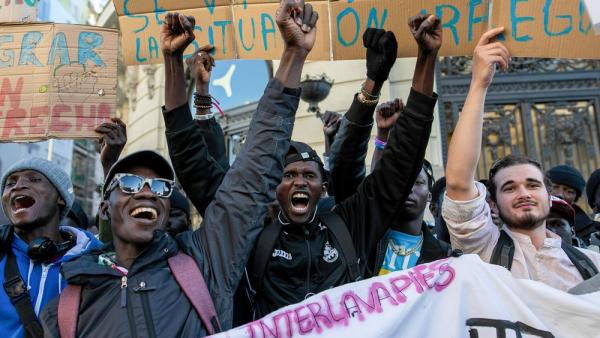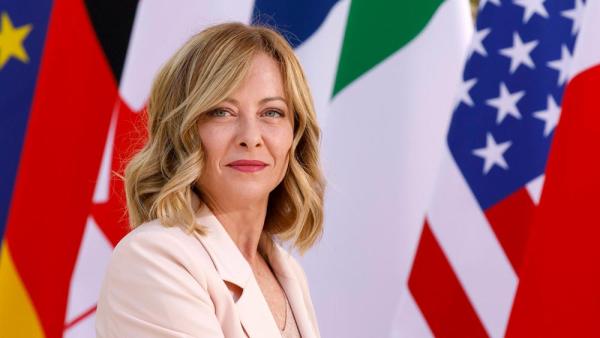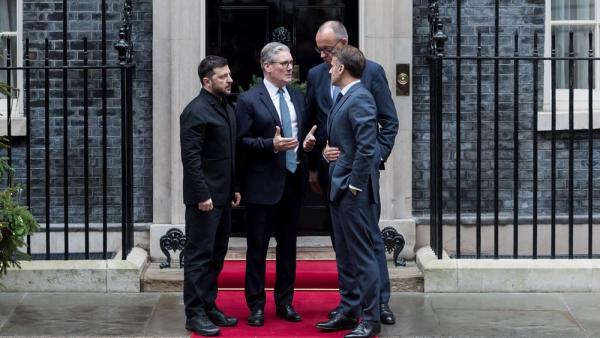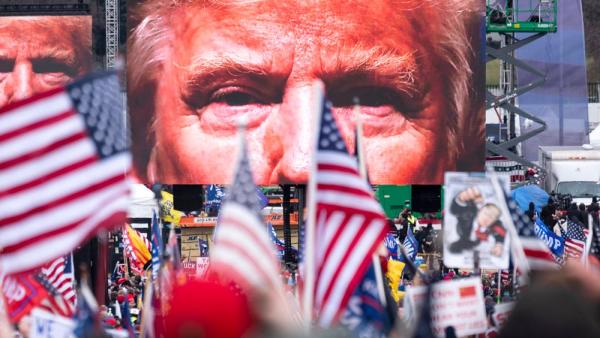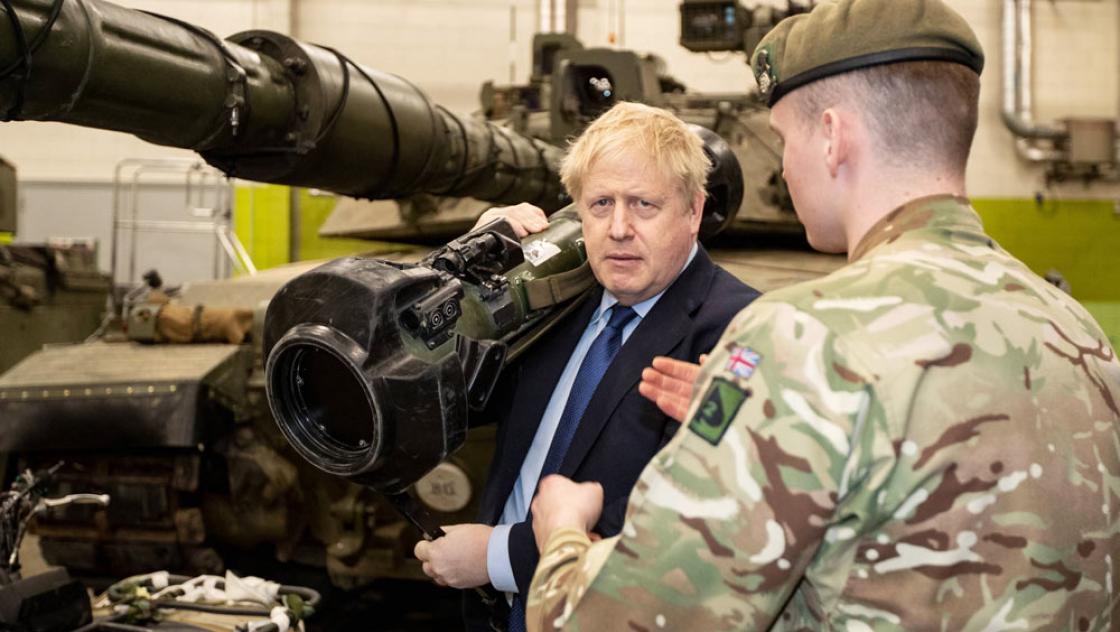
Bild: Der britische Premierminister Boris Johnson während eines Besuchs in Estland, 1.3.2022 (IMAGO / Scanpix)
Sometimes, a shift in the political landscape of an entire nation can be suddenly rendered visible by a fleeting moment, by a seemingly incidental comment. Moments such as the end of the address made by Volodymyr Zelenskyy to the House of Commons last month, beamed into the chamber via video link, where he thanked the PM personally for Britain’s early military aid to Ukraine. “I’m very grateful to you, Boris.” Yes, the Ukrainian President, at the height of his popularity, says thanks to the British Premier on first-name terms – just weeks after scandal-ridden “Boris”, in the same chamber, was battling against a potential vote of confidence from within his own party.
This brief moment made it immediately clear to every member of a parliament packed to the rafters that, from now on, the UK media would not have much space left on their front pages and in their top stories for Johnson’s illegal Downing Street Christmas parties. The rapturous applause which broke out the second Zelenskyy had finished was, primarily, in his honour – plaudits for a former TV comic turned political hero. Then again, Johnson’s close, almost chummy rapport with the Ukrainian leader is of course rubbing off back on him; it helped all the more that Zelenskyy quoted Churchill, that figure Johnson so often seeks to emulate. If there is such a thing as political osmosis, you could see it at work here. Even Labour leader Keir Starmer, halted his attacks on Johnson in early March. The war in the Ukraine – and Britain’s decision to offer military support early on – seem to have, for now, saved the Prime Minister’s bacon.
There is a not inconsiderable irony in this inasmuch as, even after two years in office, Johnson as a statesman is still muddling through devoid of anything even remotely resembling a foreign policy strategy, especially when it comes to Europe. Of course, he deserves credit for being early to deliver defensive weapons to the Ukraine and call for a clear Western position: this was more than just headline-grabbing, and his clear stance when he visited Kiev shortly before the war and warned of an “imminent Russian attack” – rightly, as it turned out.
Nevertheless, Johnson’s close relationship with the Ukrainian President is primarily due to the fact that, with the Brexit pall yet to clear, he is still doing his best to ignore the EU as a political unit and exploring every possible path around it. As such, all efforts are made to avoid joint appearances with French President Emmanuel Macron or German Chancellor Olaf Scholz; instead, bilateral relations with third countries are supposed to give some shape to what, even six years after the referendum, remains a broadly empty slogan: ‘Global Britain’. Government rhetoric in this regard is still focussed on the Indo-Pacific; and if Europe is mentioned at all, the focus is on forming alliances with opponents of the EU or sceptics within it. It was not by chance that Viktor Orbán was the first European head of state to be given a photo opportunity with Johnson in Downing Street following his election win in 2019.
Britain needs to develop a policy strategy when it comes to the EU
Yet in view of the seismic geopolitical shockwaves which Putin’s attack on the Ukraine is sending out across the world, it is precisely this Brexit fantasy of a strong, self-reliant ‘Global Britain’ going it alone which is being made to look very much like yesterday’s idea. Instead, the island nation is being given a painful reminder of its own geographical situation, and very much as military plans seldom survive first contact with the enemy, if you know where to look, it is now possible to see the pie-in-the-sky dreams of a new British sphere of influence in Asia being torn up by the simple fact that Britain is and remains an island just off the European landmass. A Russia weakened by the consequences of its war and forced to enter into a strategic alliance with China will, both in diplomatic and economic terms, hem in a United Kingdom looking to act there on its own account.
In Europe, too, where Johnson and his Brexiteers have thus far been counting on a weak EU riven by with internal conflicts, the situation has changed fundamentally: Britain’s security is now inextricably linked to the success of the EU as a strong political and economic opponent to Putin’s Russia. The war in the Ukraine will, in the medium term at the very latest, teach this lesson to even the most passionate of Brexiteers: if the European project fails, the continent will become a chessboard across which the remaining superpowers – Russia and China on one side, the USA on the other – will start to fight their proxy wars. In terms of security policy, this state of affairs would represent a threat to the UK, too. The result is that Putin’s war makes a political and economic rapprochement between London and Brussels unavoidable.
The first signs that this imperative has been understood in London have become visible in recent weeks. In contrast to her predecessor in the role of negotiator vis-à-vis Northern Island, Lord Frost, Foreign Secretary Liz Truss is currently to all outward appearances refraining from the threatening tone towards Brussels which had become chronic and heading down a notably more pragmatic path instead. The confrontational wrangling about the Northern Island Protocol seems to have, for the moment at least, been laid aside. This new friendlier tone may change, of course, because overall the long shadow of Brexit and its ideological, often xenophobic rhetoric, is still hanging over Britain’s political discourse; and just because Boris Johnson is a political survival artist and extemporiser par excellence with a good feel for who, like Zelenskyy, is the man of the hour, this does not by any means make him into a reliable ally. The Ukrainian President was, for instance, tactful enough to not mention the UK government’s approach to taking on refugees from his country – an approach in diametrical opposition to Johnson’s continuous declarations of solidarity with the Ukrainian people.
The borders are closed to Ukrainian refugees
While, within a matter of days, the EU 27 were welcoming those fleeing Putin’s offensive with open arms, Johnson closed the border: in the early days of the war, Ukrainians were only allowed into the UK if they could prove they had at least one family member already living there – and had to have a visa, too. Ukrainians who had spent days crossing the continent were stopped at Calais, referred to the British Embassy in Paris, and then left standing in the cold. Home Secretary Priti Patel’s statement on the matter was that there had been a conscious decision not to set up a reception centre in Calais for fear that Ukrainian refugees might then end up falling into the hands of human traffickers. This line of argument is of course deeply cynical: if refugees are allowed to enter quickly, then there is no danger of them needing to resort to illegal means. The result was hundreds of Ukrainians continuing their arduous wanderings through France as they tried to get into the UK.
In early March, the French Minister of the Interior accused Britain of showing a “lack of humanity”[1], but it wasn’t until the Government’s deeply inhuman approach was criticised from within the Tory party itself that changes were made. The shift in public opinion played was certainly a factor, too: in view of the generosity shown by other European countries, a majority of Britons was also in favour of a more liberal policy[2]. Nevertheless, there is no change to the visa requirement, and in an interview in early March, Johnson justified this with an argument straight out of the Brexit Handbook: Britain could not relinquish control of its borders; the EU, according to Johnson, had no other choice but to let Ukrainians in due to Schengen; Britain was now able to control who entered the country.
Leaving aside the fact that Ukraine is not in the Schengen Area, Johnson also tried to create a false impression that, thanks to Brexit, Britain had now become a more secure country than its EU neighbours – an impression he also tried to convey in parliament when he noted that there might, of course, be Russian spies among the Ukrainian refugees who could represent a threat to national security. This was a deliberate attempt to sow fear and mistrust of those fleeing the conflict and, for good measure, destroyed a good part of the soft power Britain had accumulated by showing itself to be a friend of Ukraine.
Johnson is caught up with Russian oligarchs
Johnson’s argument is also in and of itself absurd inasmuch as there is probably no other European country which Russian citizens can, provided that they have sufficient wealth, enter and leave with such ease and frequency. A putative Russian spy wouldn’t even have to go to the trouble of dressing up as a Ukrainian refugee in order to get past the Border Force.
What is more, in respect of his own close friendship of many years’ standing with Evgeny Lebedev, the son of a former KGB officer, Johnson himself showed scant regard for security concerns held by his own secret service with regard to Russian oligarchs. Lebedev’s newspaper had provided repeated political support to Johnson in his campaign to be Mayor of London[3] and when, in 2020, Johnson chose to recognise this by making Lebedev a life peer in the House of Lords, the Secret Intelligence Service MI6 objected on grounds of national security. In their view, Lebedev had, in the years preceding the nomination, again and again defended Putin’s official policy line and had even taken to Twitter to spread the suspicion that MI6 itself might have been behind the 2006 murder of Alexander Litvinenko[4]. Yet Johnson insisted on Lebedev, and so in autumn 2020, he was created “Baron Lebedev of Hampton in the London Borough of Richmond upon Thames and of Siberia in the Russian Federation” – and was then immediately entitled to vote on laws to be passed by Parliament.
When Johnson, in the early days of the war, was conspicuously slow in sanctioning Russian oligarchs, it wasn’t just the opposition who suggested that this sluggish response might have more than just a little to do with close relations between the Tories and Russian money. Since Johnson came to power, the party has, according to figures compiled by Labour, received almost two million pounds in donations from Russian sources who have relationships to Vladimir Putin which are, at best, murky; over the past five years, this total is calculated to be closer to six million pounds[5].
When questioned in Parliament in March, Johnson responded – as so often – with outright lies, claiming that the Kremlin itself had singled Britain out as the country which had imposed the hardest sanctions on Russia worldwide; he also made the assertion that the UK had already hit over 100 oligarchs with sanctions. As soon became clear, neither of these claims was true[6]. In actual fact, Britain in mid-March was trailing far behind the EU and USA in terms of sanctioning Russian oligarchs[7], and as public pressure mounted, the Government decided to take a short-cut: by law, Britain can now, as of mid-March, sanction any oligarchs against whom the EU has already imposed sanctions. Admirably, EU Commission Vice-President Frans Timmermans managed to refrain from excessive sarcasm when he noted on the BBC that Britain was now following the EU’s lead and that he was very sure it would continue to “because the pressure of public opinion in the UK is very clear about this.”[8] Simply entering into a pragmatic cooperation with the EU would have made for a much better look.
Britain needs to take the principles of liberal democracy seriously
The unnecessary antagonism with the EU which Johnson, still overshadowed by Brexit rhetoric, continues to ply is currently having two key consequences: firstly, it is leading to chaotic action and repeated U-turns in UK Government domestic policy; secondly, it is robbing foreign policy of coherency. The difficulty the Johnson Administration is still having in developing even a basic level of pragmatism in its relations with the EU became particularly clear recently when Liz Truss was, at the first British minister since Brexit, invited to take part in a meeting of EU foreign ministers regarding the war in the Ukraine; Truss could, however, not bring herself to term the meeting as such, as her tortured Twitter phrasing demonstrated[9].
Just last year, London had, in the form of its ‘Integrated Review’[10] laid down a foreign-policy concept by no means devoid of merit. Yet even then, the fact that the EU was widely ignored as a potential partner in foreign and security policy was bizarre – and the new geopolitical situation has taken it into the realm of the absurd. If for no other reason than British self-interest, this hole in the country’s foreign policy doctrine must be filled for very obvious reasons.
Moreover, in a broader sense, the time for the likes of Johnson and his frivolous antics is well and truly past. It is simply not enough to play-act at being Churchill, cracking jokes and basking in the reflection of a friendship with the Ukrainian President – all the less so when, at home, the British premier continues to bend the truth and keep shadow-boxing an imaginary opponent in the shape of the EU. The whole misery of the situation becomes particularly clear at moments like the Conservative Party Conference in late March, where Johnson made the grotesque comparison between the resistance of the Ukrainian people in the face of the Russian onslaught and this British public’s vote for Brexit[11]: a remark that was beyond tasteless and a sad sign of just how far down its lonely insular path Britain has gone.
When Volodymyr Zelenskyy begs Europe for help, he doesn’t just mean countries in the geographic and geopolitical area of the continent, but also – and perhaps to an even greater degree – the idea of the European project, standing as it does as the antithesis to Putin’s intentions. Zelenskyy is appealing to the principles of liberal democracy, of international law, and the rule of law. These, however, are predicated on defending reality from the assault of propaganda, lies, and nationalist fantasies, on preserving truth from a demise amid these blurry equivocations. If Boris Johnson wants to be a genuine friend and ally to the Ukraine and a real part of the Western alliance, then he must accept these principles and take them seriously. Yet it is precisely these principles which, in the way he has been implementing Brexit thus far, he repeatedly calls into question.
Translated by Brian Melican.
[1] Sam Jones, Amelia Gentleman und Aubrey Allegretti, France accuses UK of ‘lack of humanity’ over Ukrainian refugees, www.guardian.com, 6.3.2022.
[2] Support for taking in Ukraine refugees rises to 76%, www.yougov.co.uk, 02/03/2022
[3] Since 2012, Johnson has made repeated visits to Lebedev’s Italian estate in Perugia, often alone, without witnesses and with no security detail. Like many other things, his flights there were regularly paid for by Lebedev himself. Immediately following his election as Prime Minister, Johnson celebrated his arrival at the top in Lebedev’s presence at a London party. See Harry Yorke, Gabriel Pogrund and Rosamund Urwin, How Boris Johnson’s friendship with Evgeny Lebedev deepened despite MI6 concerns, www.thetimes.co.uk, 12/03/2022.
[4] ibid
[5] Nigel Nelson, Labour demands Tory Party pay back donations from Russians and end corruption at home, www.mirror.co.uk, 05/02/2022
[6] Sanctions on Russia: Did the UK sanction 100 people last week?, www.bbc.com, 03/03/2022; Foreign Secretary Liz Truss later conceded the point.
[7] Jasper Jolly, UK to speed up sanctions on Russian oligarchs by copying allies’ decisions, www.guardian.com, 04/03/2022
[8] Daniel Boffey, EU urges UK to act faster before Russian assets are spirited away, www.guardian.com, 03/03/2022
[9] www.twitter.com/trussliz, 04/03/2022
[10] Global Britain in a Competitive Age: the Integrated Review of Security, Defence, Development and Foreign Policy, www.gov.uk, 16/03/2021
[11] Toby Helm und Daniel Boffey, Fury greets Boris Johnson’s claim Ukraine fight is like Brexit, www.theguardian.com, 19.3.2022.




